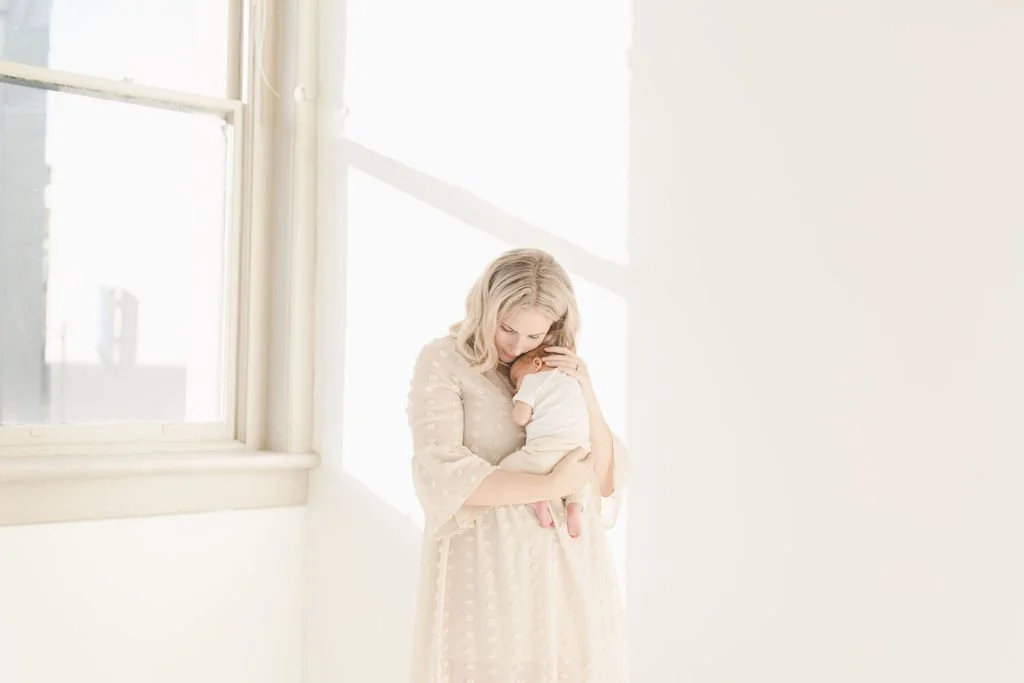7 BABY SLEEP MYTHS EVERY PARENT NEEDS TO STOP BELIEVING
When it comes to baby sleep, advice comes at you from all directions—friends, family, the internet, and even strangers at the grocery store. It can feel overwhelming trying to sift through what’s helpful and what’s just plain outdated. As a baby and toddler sleep consultant, I hear the same myths over and over again—beliefs that often leave parents frustrated, exhausted, and second-guessing themselves.
Let’s set the record straight. Here are 7 common baby sleep myths that every parent needs to stop believing:
Myth #1: Keeping Baby Up Longer Will Help Them Sleep Better
This is one of the most common misconceptions—and one that will almost always backfire on you. Overtired babies have a harder time settling and staying asleep. When babies stay up too long, their bodies produce cortisol (a stress hormone), which makes it even more difficult for them to fall and stay asleep. The truth? Age appropriate wake windows, well-timed naps and earlier bedtimes often lead to better, longer stretches of sleep.
Myth #2: Some Babies Just Don’t Need Much Sleep
While every baby is unique, most babies require more sleep than we think. Frequent night wakings or short naps aren’t a sign that your baby just needs less sleep—it’s usually a sign that something in their sleep routine, environment, or schedule needs adjusting. Healthy sleep habits support growth, brain development, and mood—for both baby and parents!
Myth #3: Sleep Training Means Letting Baby Cry It Out
“Cry it out” is just one approach (an approach that I DON’T use!), and it’s not the only option. Sleep training simply means teaching your baby to fall asleep independently—and there are gentle, responsive methods that don’t involve leaving your baby to cry alone. Sleep support can be tailored to your baby’s age, temperament, and your parenting style.
Myth #4: Feeding Baby to Sleep Is Always a Bad Habit
Feeding to sleep isn’t inherently wrong—it’s a lovely bonding experience and a very natural part of the newborn phase. However, if your baby is waking frequently and can’t resettle without feeding every time, it may be time to gently shift the feed/sleep association. There’s no need to cut out all feeds, but some simple tweaks can help your baby sleep more independently.
Myth #5: Babies Will Naturally Learn to Sleep on Their Own
While some babies may figure out sleep with little intervention, most little ones need a bit of guidance and consistency. Just like walking or eating solids, sleep is a skill—and it can be taught with support, consistency & patience. Waiting it out indefinitely can lead to more exhaustion and stress for the whole family.
Myth #6: Short Naps Mean Something Is Wrong
Short naps are extremely common in the first few months of life. A baby’s sleep cycle is about 30–45 minutes long, and it can take time for them to learn how to connect those cycles. Short naps don’t always indicate a problem—but if they persist beyond the newborn stage, we may need to look at wake windows, sleep environments, or schedule tweaks.
Myth #7: If Baby Sleeps Through the Night Once, They Always Will
Wouldn’t that be nice?! But just because your baby slept through the night once (or even for a week), doesn’t mean it’s locked in. Sleep isn’t linear—developmental leaps, teething, illness, or changes in routine can all disrupt even the best sleepers. The good news is that with solid foundations in place, you can bounce back quickly. Have patience!
Navigating baby sleep doesn’t have to be confusing or frustrating. By letting go of these common myths, you can focus on what actually works—for your baby and your family. If you're feeling stuck or overwhelmed, I'm here to help with a personalized sleep plan that supports better rest for everyone– Let’s chat

